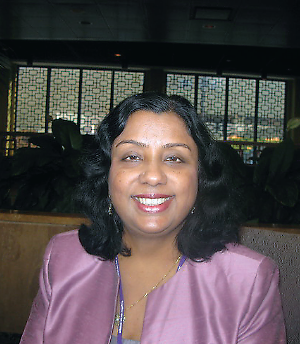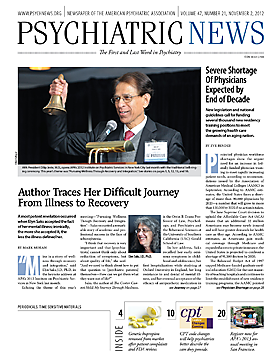Vijaya Appareddy, M.D., remembers watching as a young girl in India the physician who has had the greatest impact on her life.
“My father was trained in England as a plastic surgeon, but came back to India because in those days they had very few surgeons,” she said. “I used to watch him do surgery, and in my high school years, I was even allowed to assist him in small ways.
“I was inspired by his generosity and compassion for his patients,” Appareddy told Psychiatric News. “He worked for a hospital and donated his services providing a lot of free care, and even in his private practice, he took on patients regardless of their ability to pay.”
That inspiration led Appareddy to follow her father into medicine and in service to the disadvantaged. Today, she is a leader in advocacy for, and treatment of, children and adults with developmental disabilities.
Appareddy is also one of a number of young psychiatrists who have brought a new energy to the AMA, and as chair of the AMA’s Section on International Medical Graduates, she has helped make APA and psychiatry among the most potent voices in the AMA House of Delegates.
AMA Looks Very Different
Her presence in the House of Delegates is evidence of the striking change in the demographics of the house in recent decades: Today nearly 20 percent of AMA delegates and alternate delegates are women, compared with 1983, when 1.8 percent of delegates and 3.0 percent of alternate delegates were women. Moreover, 8.25 percent of AMA delegates and alternate delegates are international medical graduates, compared with 2.5 percent of delegates and 2.6 of alternate delegates in 1983.
Carolyn Robinowitz, M.D., who is chair of the Section Council on Psychiatry and has participated in the AMA House of Delegates since the late 1970s, said Appareddy is “inspirational, energetic, and very effective in her advocacy, as well as a superb spokesperson for international medical graduates.”
Robinowitz added, “Her appointment and leadership document the important contributions psychiatrists are making to the work of the AMA, as well as the AMA’s active commitment to a diverse and involved membership.”
Appareddy graduated from medical school and completed a residency in obstetrics-gynecology in India. An interest in psychiatry was kindled by her work with ob-gyn patients, and she sought out training in general psychiatry at Mount Sinai School of Medicine. “I noticed during my ob-gyn residency in India that I would spend a lot of time talking to women and counseling their families,” she said. “So psychiatry came naturally to me.”
It was during a child psychiatry fellowship at Mount Sinai Hospital that Appareddy discovered what has become a career-long passion—the treatment of children with developmental, including intellectual, disabilities. At the Warren Alpert Medical School of Brown University, where she took a position as an assistant professor of psychiatry, Appareddy was mentored by Carl Feinstein, M.D., then chief of a unit for children with developmental disabilities.
In 2002 she was appointed by President George W. Bush to be vice chair of the President’s Committee on Intellectual Disabilities, previously known as the Committee on Mental Retardation. Appareddy was instrumental in seeking an executive order to change the name and was present at the White House when Bush signed the order.
(The committee originated under President John F. Kennedy and has been reauthorized by every president since then to advise the government on how to enhance services for people with intellectual disabilities.)
For Appareddy, service on the committee—which included members with disabilities—was transformative. “On the committee were representatives from all of the major federal departments, and a lot of them had physical disabilities,” Appareddy said. “There were also representatives to the committee who had mild intellectual disabilities. It was extraordinarily inspiring to see how these individuals had overcome their challenges to become so successful in life.”
Physicians Speak With One Voice
Last year Appareddy brought her passion to the AMA, where she was instrumental in the passage of AMA policy supporting a simplified process for designating individuals with intellectual disabilities as a medically underserved group.
(The Patient Protection and Affordable Care Act requires the Health Resources and Services Administration to revamp and simplify its process for designating groups as medically under-served, and the agency has proposed a simplified process that has yet to be finalized.)
At the 2010 Interim Meeting of the AMA House of Delegates, it was Appareddy who suggested the idea to the house in the form of a resolution, which was referred to the Council on Medical Services. At the 2011 Interim Meeting, the council report with recommendations supporting the designation was approved unanimously.
She told Psychiatric News that the designation will enhance access to and the quality of health care services for intellectually disabled individuals by making federal dollars available for conducting research, training medical students and residents, increasing payment to clinicians working with this population, and enhancing family and community services.
“The AMA’s support carries a lot of weight because people pay attention to what the AMA endorses and supports,” she told Psychiatric News after the meeting last year. “And it is important symbolically because every specialty and subspecialty are speaking with a unified voice, through the AMA, for increased services for this population.”
For Appareddy, that unified voice is what makes the AMA important. “Physicians sometimes complain about issues, but you can’t expect things to change on their own,” she said. “Organized medicine is one of the ways for doctors to make their voices heard. The AMA is the place where physicians of every specialty can speak with a strong, united voice.”


